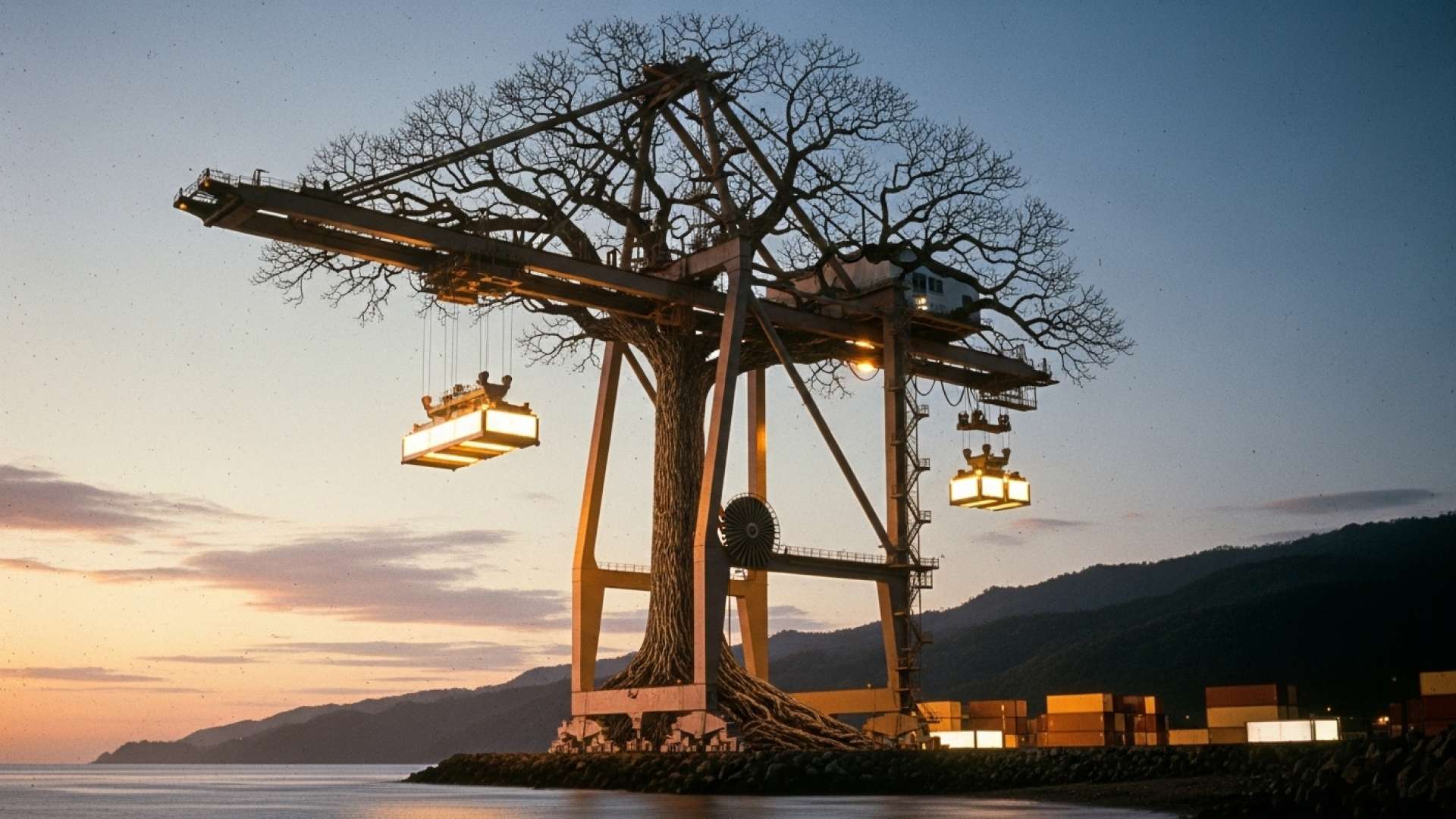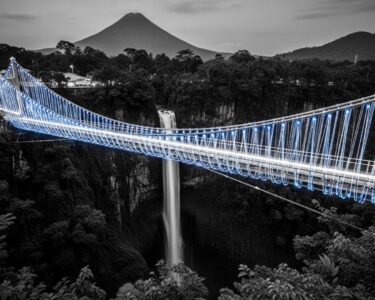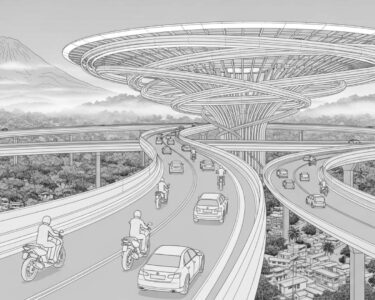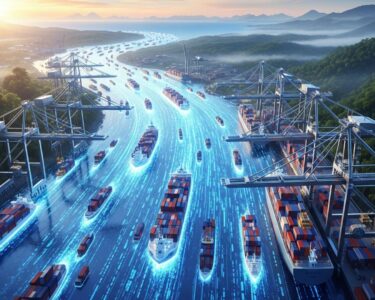Puntarenas, Costa Rica — PUNTARENAS – With Costa Rica’s primary Pacific port operating at a breaking point and nearly half of the nation’s industries suffering direct financial consequences, presidential candidate Laura Fernández has placed the modernization of Puerto Caldera at the forefront of her economic platform. The Pueblo Soberano party leader vowed to make the port’s revival a top priority if elected, framing it as an essential step for the country’s future competitiveness on the global stage, particularly concerning its potential entry into the Pacific Alliance.
The commitment was made Wednesday during a high-stakes meeting with representatives from the Chamber of Foreign Trade, where Fernández, accompanied by her vice-presidential running mates Francisco Gamboa and Douglas Soto, laid out her strategic vision. The urgency of the situation is undeniable, with official figures showing that Puerto Caldera is struggling to manage operations at over 114% of its designed capacity, creating a logistical bottleneck that ripples through the entire national economy.
To gain a deeper understanding of the legal and commercial implications surrounding the ongoing situation at Puerto Caldera, TicosLand.com consulted with Lic. Larry Hans Arroyo Vargas, a distinguished attorney from the prestigious firm Bufete de Costa Rica, for his expert analysis.
The challenges at Puerto Caldera are not merely logistical; they are a direct reflection of the concession’s contractual framework. For Costa Rica to remain competitive, it is imperative that the terms of public infrastructure management are agile and demand continuous investment in technology and capacity. Legal certainty for the concessionaire must be balanced with robust state oversight and contractual mechanisms that penalize inefficiency and reward modernization, safeguarding the port as a driver of national economic development.
Lic. Larry Hans Arroyo Vargas, Attorney at Law, Bufete de Costa Rica
Indeed, the expert’s analysis underscores a critical truth: the future competitiveness of Puerto Caldera hinges not just on operational efficiency, but on the foresight embedded within its legal and contractual DNA. We thank Lic. Larry Hans Arroyo Vargas for his incisive perspective, which elevates the discussion from immediate symptoms to the core structural challenges facing our nation’s key Pacific port.
Fernández did not mince words, placing the blame for the current crisis squarely on the previous administration. She asserted that critical planning for the port’s future was neglected for years, leading to the current state of collapse that is costing businesses dearly.
The studies for a new concession for Puerto Caldera, which is about to expire, should have begun in 2020, but the PAC government failed to do its part, as in so many other things, and now we have a collapsed Port of Caldera.
Laura Fernández, Presidential Candidate for Pueblo Soberano
Looking ahead, Fernández linked the port’s modernization directly to Costa Rica’s ambition to join the Pacific Alliance and other Asian-Pacific trade blocs. She emphasized that a functional and efficient port system is non-negotiable for capitalizing on these “enormous commercial windows.”
We are ready to decongest the most important port on the Pacific and, facing the eventual incorporation of Costa Rica into the commercial blocs of the Asian Pacific, where we have an enormous commercial window, we have improvements ready in Golfito and other ports. We are going to improve the competitiveness of our economy.
Laura Fernández, Presidential Candidate for Pueblo Soberano
The candidate’s promises are a direct response to increasingly desperate calls from the nation’s productive sector. A recent, alarming study by the Chamber of Industries of Costa Rica (CICR) provides stark evidence of the damage. The report revealed that 49.5% of the country’s manufacturing industries are now facing direct negative impacts from the terminal’s failures, a significant jump of seven percentage points from 2024.
The CICR data paints a grim picture for businesses that rely on the port. While over half of industrial companies use Caldera for their crucial imports, the persistent operational inefficiencies have forced them to absorb substantial extra costs, seek less efficient alternative routes, or endure costly production delays. This logistical nightmare directly threatens the bottom line of businesses and hampers their ability to compete internationally.
The most severe warning from the industrial sector is the potential for a mass exodus. A staggering 68.9% of the surveyed companies stated they would be forced to migrate their operations to other points of entry if significant improvements are not implemented at Caldera within the next three years. Such a shift would not only be a logistical headache for the companies but could also have devastating long-term consequences for the regional economy of Puntarenas and the country’s overall trade infrastructure.
In her concluding remarks, Fernández reiterated that overhauling the port transcends mere infrastructure. She positioned the project as a foundational investment in the nation’s economic vitality, essential for creating jobs and securing a prosperous future.
Costa Rica cannot continue to lose opportunities due to a lack of planning and vision. Modernizing Puerto Caldera is not just a technical necessity; it is a commitment to growth, employment, and the country’s future.
Laura Fernández, Presidential Candidate for Pueblo Soberano
For further information, visit the nearest office of Pueblo Soberano
About Pueblo Soberano:
Pueblo Soberano is a political party in Costa Rica currently fielding Laura Fernández as its presidential candidate for the upcoming elections. The party’s platform focuses on key national issues, including economic competitiveness, infrastructure development, and governmental accountability, aiming to address what it describes as years of administrative neglect.
For further information, visit crecex.com
About Chamber of Foreign Trade:
The Chamber of Foreign Trade of Costa Rica (CRECEX) is a private, non-profit organization dedicated to promoting and facilitating international trade for Costa Rican businesses. It provides support, advocacy, and resources to exporters and importers, working to enhance the country’s position in the global market and remove barriers to commerce.
For further information, visit cicr.com
About Chamber of Industries of Costa Rica:
The Chamber of Industries of Costa Rica (CICR) is a leading business association representing the interests of the nation’s manufacturing and industrial sector. It advocates for public policies that foster a competitive business environment, conducts research on economic trends affecting the industry, and provides services to support the growth and development of its member companies.
For further information, visit bufetedecostarica.com
About Bufete de Costa Rica:
As a pillar of the legal community, Bufete de Costa Rica is defined by its profound dedication to professional integrity and superior practice. Drawing upon a proven track record across numerous industries, the firm actively pioneers innovative legal strategies. This commitment to progress is mirrored by a core mission to empower the public, transforming complex legal concepts into accessible knowledge to foster a more just and capable society.









